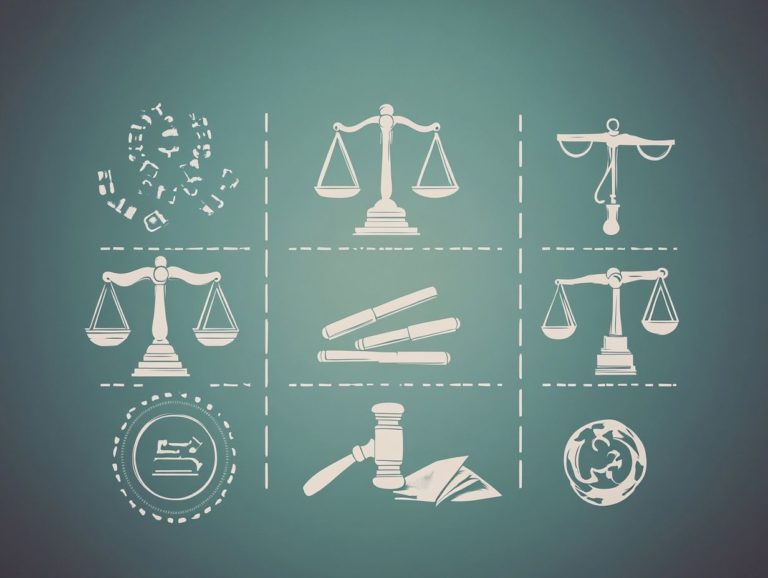The Connection Between Mental Health and Crime
Mental health and crime share a complicated relationship, with many studies showing how psychological issues can shape criminal behavior.
This exploration delves into the connection between mental health disorders and criminal activity, identifying common conditions found in offenders and analyzing how these disorders influence their actions.
It also examines treatment options available in the criminal justice system and outlines strategies to prevent mental illness, aiming to reduce recidivism and promote mental wellness. Join us on this journey to uncover this crucial relationship.
Contents
- Key Takeaways:
- The Relationship Between Mental Health and Crime
- Common Mental Health Disorders in Criminal Offenders
- The Impact of Mental Health on Criminal Behavior
- Treatment Options for Mentally Ill Offenders
- Preventing Mental Illness in the Criminal Justice System
- Frequently Asked Questions
- What is the connection between mental health and crime?
- Can mental health issues lead to criminal behavior?
- What are some common mental health disorders associated with crime?
- Does everyone with a mental illness commit crimes?
- How can treating mental health reduce crime rates?
- What steps can improve the link between mental health and crime?
Key Takeaways:
Mental illness and crime have a complicated relationship, with mental health issues often contributing to criminal behavior.
Identifying and treating mental illness in offenders can help reduce recidivism and promote overall mental wellness.
The criminal justice system should prioritize addressing mental health issues to prevent and reduce crime.
The Relationship Between Mental Health and Crime
The relationship between mental health and crime is complicated and deserves careful consideration. Studies reveal a strong link between mental illness, substance abuse, and violence, indicating that socio-demographic and socio-economic factors also play a role in violent behaviors, especially in the criminal justice system.
Understanding these connections can help us take action to develop effective interventions that enhance public safety and reduce community violence. We must implement violence risk assessments and support services that address mental health conditions while tackling the stigma surrounding them.
Exploring the Connection
Exploring the connection between mental health and crime helps us understand how mental health conditions can influence violent behavior and the effectiveness of violence prevention strategies in our communities.
Conditions like schizophrenia and bipolar disorder can alter perceptions and decision-making processes, leading to actions that may not reflect an individual s usual behavior.
It s essential to dig deeper into how these mental health issues can trigger conflict or aggression, often worsened by societal stigma and a lack of accessible healthcare services.
By establishing strong community controls and fostering an environment that prioritizes mental well-being, we can effectively reduce risks.
Implementing evidence-based interventions not only supports treatment but also enhances public safety, creating a nurturing framework for individuals facing serious mental health challenges.
Common Mental Health Disorders in Criminal Offenders
Common mental health disorders found in criminal offenders include major depression, schizophrenia, and substance-related disorders.
These conditions frequently lead to the presence of two or more disorders in an individual, which exacerbates their mental health challenges and increases the risk of criminal involvement.
Identifying and Understanding Mental Illness in Criminals
Identifying and understanding mental illness in criminals is essential for implementing effective risk assessment and intervention strategies that meet their needs while addressing societal concerns.
When assessing these individuals, we often rely on structured professional judgment and risk assessment techniques. These tools allow us to evaluate the potential for recidivism while considering the psychological factors involved.
It s crucial to balance the clinical insights from these assessments with an awareness of the stigma surrounding mental illness, as this stigma can shape public opinion and influence treatment approaches.
Such perceptions may create hesitance in seeking help, highlighting the need for accurate identification of mental health issues and broader societal education aimed at fostering understanding and acceptance.
The Impact of Mental Health on Criminal Behavior
The impact of mental health on criminal behavior is significant. When individuals grapple with unresolved mental health issues, they may exhibit violent tendencies that lead to encounters with the criminal justice system.
This reality highlights the urgent need for effective treatment protocols to address these complex issues effectively.
How Mental Health Can Contribute to Criminal Actions
Mental health conditions can significantly influence criminal behaviors, especially when left untreated. This can increase the likelihood of relapsing into criminal behavior and lead to aggressive actions that threaten public safety.
Consider specific cases involving individuals with severe anxiety or bipolar disorder. The lack of proper support and intervention can escalate situations, resulting in serious offenses.
These instances highlight the urgent need for comprehensive risk assessment strategies. These strategies should consider psychological factors and include treatments that are proven effective based on scientific research.
By implementing such measures, we can address underlying issues, lower the chances of future incidents, and enhance overall community safety. This approach could revolutionize mental health management within the justice system.
Treatment Options for Mentally Ill Offenders
Treatment options for mentally ill offenders encompass a range of psychiatric care and mental health services designed to tackle their specific conditions.
These approaches aim to improve mental well-being while also enhancing access to healthcare and ensuring adherence to treatment plans.
Addressing Mental Health in the Criminal Justice System
Addressing mental health in the criminal justice system requires a nuanced approach that prioritizes treatment while enhancing public safety and promoting community controls to mitigate risks associated with criminal behavior.
We must implement comprehensive health coverage policies that go beyond traditional incarceration methods. By ensuring that offenders have access to therapy, medication, and support services upon their release, we can significantly reduce repeat offenses.
Integrating mental health professionals into correctional facilities enables early intervention and ongoing care, creating an environment where recovery is truly attainable. Community-based programs are essential, offering resources like job training and counseling that are crucial for successful reintegration.
Ultimately, fostering a rehabilitative rather than punitive framework can transform lives and enhance community safety, benefiting everyone involved.
Preventing Mental Illness in the Criminal Justice System
Preventing mental illness within the criminal justice system is essential for reducing recidivism and promoting mental wellness among offenders.
By implementing effective treatment protocols and targeted prevention strategies, we can significantly contribute to this important cause.
Strategies for Reducing Recidivism and Promoting Mental Wellness
Strategies for reducing recidivism and promoting mental wellness should include a variety of mental health services tailored to individual needs, ensuring compliance with treatment protocols.
This comprehensive approach not only provides access to therapy and counseling but also emphasizes the importance of community controls, such as mentorship programs and job placement services.
Continuous support from local organizations creates a vital safety net as individuals reintegrate into society, helping them navigate the challenging transition. By actively participating in mental health initiatives, individuals can enhance their emotional stability, equipping themselves with coping mechanisms to manage stress and triggers.
Addressing these multifaceted issues allows the justice system to cultivate an environment that encourages rehabilitation over punishment, ultimately aiming to lower the risk of reoffending.
This video discusses the impact of mental health on criminal behavior, providing insights into the necessary interventions.
Frequently Asked Questions
What is the connection between mental health and crime?
The connection between mental health and crime refers to how an individual’s mental state can relate to their involvement in criminal behavior. This includes mental illnesses, substance abuse disorders, and other psychological factors that may contribute to criminal actions, highlighting the importance of understanding the connection between drugs and crime.
Can mental health issues lead to criminal behavior?
While mental health issues don t directly cause criminal behavior, they can increase the likelihood of engagement in criminal acts. Factors such as impaired decision-making, poor impulse control, or inadequate access to treatment and support can contribute to this increased risk.
In conclusion, it’s crucial to advocate for mental health awareness within the justice system. Together, we can ensure better treatment and support for those in need.
What are some common mental health disorders associated with crime?
Common mental health disorders linked to crime include schizophrenia, bipolar disorder, depression, and substance use disorders. These conditions can affect judgment and lead to impulsive or aggressive actions.
Does everyone with a mental illness commit crimes?
Not everyone with a mental illness commits crimes. While mental illness is more common among those in prison, most individuals with these conditions are not involved in criminal activities. In fact, many are more likely to be victims of crime.
How can treating mental health reduce crime rates?
Treating mental health can lower crime rates by offering proper support and care. This not only helps manage symptoms but also reduces the chance of criminal behavior.
What steps can improve the link between mental health and crime?
Improving the connection between mental health and crime requires early intervention and better access to treatment. We must also work to destigmatize mental illness and provide resources for those in need.





